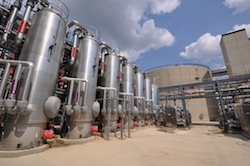DC Water has unveiled it’s $470 million Blue Plains waste-to-energy project that converts biosolids waste to electricity. The facilities include a dewatering building, 32 thermal hydrolysis vessels, four concrete 80 foot high anaerobic digesters that each hold 3.8 million gallons of solids, and three jet engine-sized turbines.

CAMBI thermal hydrolysis vessels in foreground, anaerobic digesters in the background. Photo Credit: DC Water
The company said the project was viable through CAMBI thermal hydrolysis process, the first time the technology has been used in the U.S. DC Water also says with the process now in operation, the Blue Plains facility is the largest of its kind in the world.
DC Water CEO and General Manager George S. Hawkins, said of the facility, “This project embodies a shift from treating used water as waste to leveraging it as a resource. We are proud to be the first to bring this innovation to North America for the benefit of our ratepayers, the industry and the environment.”
Thermal hydrolysis uses high heat and pressure to “pressure cook” the solids left over at the end of the wastewater treatment process. This weakens the solids cell walls and the structure between cells to make the energy easily accessible to the organisms in the next stage of the process–anaerobic digestion. The methane these organisms produce is captured and fed to three large turbines to produce electricity. Steam is also captured and directed back into the process. Next, the solids at the end of the process are a cleaner Class A biosolids product that DC Water uses as a compost-like material. Biosolids products are currently being used around the District for urban gardens and green infrastructure projects. DC Water also plans bring a compost-like product to market.
“This is yet another example of the District leading the nation in the adoption and implementation of sustainable practices,” added District of Columbia Mayor Muriel Bowser. “DC Waters Blue Plains facility is converting waste to clean water and a nutrient-rich soil byproduct, producing energy and helping to put the District on the path towards a zero waste future.”
The company did more than a decade of research prior to bringing the new facilities into operation. The project received the 2012 Grand Prize in Planning Award from the American Academy of Environmental Engineers & Scientists, the 2012 Global Honour Award in Planning from the International Water Association, as well as one of two WERF Excellence in Innovation Awards, first presented at WEFTEC 2011.

